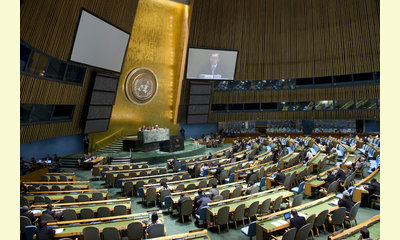|
|
Education crucial to engender a ‘culture of peace,’ UN officials stress at General Assembly
un articulo por UN News Centre
Video: UN Forum on Culture of Peace
UN High-Level Forum on the Culture of Peace
Top officials of the United Nations said today (Sept 14) that education could tackle the roots of conflict by promoting an understanding of common humanity, as they opened a day-long General Assembly forum on the promulgation of a ‘culture of peace’ at the Organization’s headquarters in New York.

Wide view of the General Assembly Hall. UN Photo/Eskinder Debebe
click on photo to enlarge
“Through education, we teach children not to hate. Through education, we raise leaders who act with wisdom and compassion. Through education, we establish a true, lasting culture of peace,” Secretary-General Ban Ki-moon said at the event, which is bringing together representatives of civil society and diplomats to discuss the implementation of the UN Programme of Action on a Culture of Peace.
Adopted by the General Assembly in 1999, the Programme includes actions aimed at fostering a culture of peace through education – such as ensuring that children, from an early age, benefit from education on values and attitudes to enable them to resolve any dispute peacefully – as well as actions to promote sustainable economic and social development.
The forum comes one week ahead of the High-Level Debate on the Culture of Peace where, Mr. Ban announced, he will launch a new global initiative called ‘Education First’ to bring together a partnership to give every child the chance to attend school. “We want them to have quality lessons. And we want to strengthen their core values,” he said.
The UN chief stated that it was obvious that the absence of peace caused suffering, citing not only the civilian toll in open conflicts such as that in Syria, but also the deadly effects of discrimination, xenophobia, terrorism and human rights abuses around the world.
In that context, he noted the “terrible attacks and unrest” of recent days in Libya and elsewhere, apparently sparked, he said, by a “hateful, disgusting film” – calling it shameful to exploit the right to free expression to provoke bigotry and bloodshed, but deeming it equally wrong to exploit the resulting anger and feed “the cycle of recrimination and senseless violence.”
“To fundamentally tackle the roots of conflict, we need to promote an understanding of our common humanity,” he said, adding that education is paramount for that purpose.
Addressing the same gathering, General Assembly President Nassir Abdulaziz Al-Nasser stressed that it was not enough to prevent war to ensure peace, and advocated for active efforts to promote a culture of peace through education that champions non-violence and justice in all areas.
“The youth of today deserve a radically different education – one that does not glorify war but educates for peace,” he said. “The cause of peace needs to be understood not only in the passive sense of the absence of war, but also in the constructive sense of creating conditions for equality and social justice.”
Mr. Al-Nasser stressed that during his Assembly Presidency, which comes to term next week with the swearing-in of the President of the upcoming 67th Session, he strove to promote cross-cultural dialogue for mutual understanding, strongly supporting the Alliance of Civilizations initiative that spearheads that effort. . .
[Editor's note: a full resume of the Forum is available on the UN website.]
(Click here for a French version of this article)
|








|
DISCUSSION
Pregunta(s) relacionada(s) al artículo :
What is the United Nations doing for a culture of peace?,
* * * * *
Comentario más reciente:
:
Following the Second High Level Forum of the United Nations on the Culture of Peace, Anwarul Chowdhury, a former Under-Secretary General of the UN, had this to say about what the UN is doing for a culture of peace. His remarks were published by the Independent European Daily Express.
Civil society worldwide has been in the forefront of the global movement for the culture of peace, working diligently and patiently at the grassroots level, he said.
"I find it is the governments and power structures which are the most persistent foot-draggers with regard to advancing the culture of peace through policy steps and action," said Chowdhury, a former U.N. under-secretary-general and currently representing civil society and the Global Movement for the Culture of Peace. . .
The United Nations, he pointed out, has shown great vision by adopting its historic, norm-setting Declaration and PoA on the Culture of Peace in 1999, but has not been organised enough in making the document a system-wide flagship effort of the world body.
"I am a believer that the world, particularly the governments, will come to realise its true value and usefulness sooner than later," Chowdhury said.

|
|









